|
|
|
Sort Order |
|
|
|
Items / Page
|
|
|
|
|
|
|
| Srl | Item |
| 1 |
ID:
161423
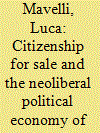

|
|
|
|
|
| Summary/Abstract |
Recent research views the proliferation of citizenship-by-investment schemes primarily as a manifestation of the commodification of citizenship by states succumbing to the logic of the market. I argue that these schemes exceed mere processes of commodification. They are part of a neoliberal political economy of belonging. This political economy prompts states to include and exclude migrants according to their endowment of human, financial, economic, and emotional capital. I show how the growing opportunities for wealthy and talented migrants to move across borders, the opening of humanitarian corridors for particularly vulnerable refugees, and the hardening of borders for “ordinary” refugees and undocumented migrants all stem from the same neoliberal rationality of government. In doing so, I challenge mainstream understandings of neoliberalism as a process of commodification characterized by the “retreat of the state” and “domination of the market.” I approach neoliberalism as a process of economization, which disseminates the model of the market to all spheres of human activity, even where money is not at stake. Neoliberal economization turns states and individuals into entrepreneurial actors that attempt to maximize their value, not just in economic and financial but also in moral and emotional terms. This process, I conclude, undermines political notions of citizenship grounded in reciprocity, equality, and solidarity, not by replacing these principles with economic ones but by rewriting these principles in economic terms.
|
|
|
|
|
|
|
|
|
|
|
|
|
|
|
|
| 2 |
ID:
161426


|
|
|
|
|
| Summary/Abstract |
This article examines public opinion toward sovereign debt disputes. Using evidence from multiple surveys fielded in Argentina—the country at the center of the most prominent legal dispute with foreign bondholders—we explore the sources of public support for debt repayment. Our evidence shows that economic self-interest and competing issue frames have little impact on attitudes toward debt repayment in Argentina. Individuals’ opinions toward debt disputes are driven primarily by their longstanding symbolic attitudes. In particular, partisan identity and presidential approval provide the strongest predictors of attitudes toward debt repayment. We also show that partisanship has particularly strong effects for well-informed voters and in periods marked by abundant information about elite positions on this issue. This supports elite-cueing theories of public opinion. These findings may help explain why some governments refuse to settle economically costly disputes with their external creditors.
|
|
|
|
|
|
|
|
|
|
|
|
|
|
|
|
| 3 |
ID:
161427
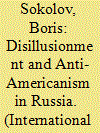

|
|
|
|
|
| Summary/Abstract |
In the early 1990s, the Russian public held overwhelmingly favorable attitudes toward the United States; in recent years, attitudes toward the United States have been overwhelmingly unfavorable. Analysts often trace this dramatic change to (1) the emergence of Russian-American conflicts such as those in former Yugoslavia and (2) Russian leaders’ attempts to escape blame for their country's failures by attributing them to a powerful external enemy. We point to another major factor of Russian anti-Americanism that preceded the international conflicts and the government-led anti-American propaganda: (3) disillusionment, or an emotional and ideological dissatisfaction with the outcome of pro-Western reforms that started among the liberal elites and then spread among the general public. Using data from the New Russian Barometer surveys, we analyze the dynamics of attitudes toward the United States from 1993 to 2009. We find that mass disappointment in the perestroika outcomes preceded the spread of anti-Americanism in Russia and that anti-American sentiment was stronger and occurred earlier among the elite than among the mass public. Furthermore, those (especially better-educated) people who express disappointment with the outcomes of pro-Western reforms prove significantly more anti-American. Our findings illustrate a general ideological phenomenon that may explain the growth of anti-Americanism in unsuccessful democracies worldwide.
|
|
|
|
|
|
|
|
|
|
|
|
|
|
|
|
| 4 |
ID:
161429


|
|
|
|
|
| Summary/Abstract |
Some scholars suggest popular culture shapes public attitudes about foreign policy in ways that can affect real-world political outcomes, but relatively few studies test this proposition. We examine whether—and more importantly how—popular culture affects public opinion on foreign policy through a survey experiment on American attitudes toward fully autonomous weapons. We queried respondents about their consumption of popular culture—including a number of iconic science-fiction films featuring armed artificial intelligence (AI)—before or after questions about autonomous weapons. We find that science fiction “priming” exerts no independent effect on political attitudes, nor does referring to autonomous weapons as “killer robots.” However, consumption of frightening armed AI films is associated with greater opposition to autonomous weapons. This “sci-fi literacy” effect increases for the highest consumers of science fiction if they are “primed” about popular culture before reporting their attitudes—what we call the “sci-fi geek effect.” Our project advances current understanding of how popular culture affects public opinion on foreign policy and suggests avenues for further inquiry.
|
|
|
|
|
|
|
|
|
|
|
|
|
|
|
|
| 5 |
ID:
161436
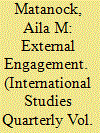

|
|
|
|
|
| Summary/Abstract |
When do settlements to civil conflict bring former combatants into normal politics as political parties? Prior work shows that electoral-participation provisions in settlements correlate with enduring peace; such provisions help end some of the longest and deadliest civil conflicts. But they are not always included in negotiated settlements. This article presents original data showing that no settlements included electoral-participation provisions until the end of the Cold War. Since then, they appear in almost half of all settlements. What explains this pattern? I argue that combatants include electoral-participation provisions to engage international actors; through these provisions, international actors can often enforce negotiated deals by monitoring and providing incentives conditioned on combatant compliance. This helps to overcome commitment problems that often prevent peaceful settlements of civil conflicts. An analysis of data on civil conflicts and settlements since 1975, as well as illustrative case evidence, provides support this argument.
|
|
|
|
|
|
|
|
|
|
|
|
|
|
|
|
| 6 |
ID:
161432
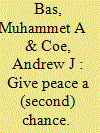

|
|
|
|
|
| Summary/Abstract |
We develop a theory of when a deal can be made to stop a state pursuing nuclear weapons, thereby avoiding proliferation or conflict to prevent it. We show a deal can only be made if costly conflict would occur in its absence. Deals are most likely to be made early, when the state's nuclear program is rudimentary, or late, when it is believed to be nearing success, but not in between. A late deal is credibly enforced by more severe punishment than an early one—immediate conflict rather than merely sanctions—and yet must be more generous to the state. If the state anticipates that a late deal would be offered, it will refuse an early deal in favor of continuing its program to secure the more generous late deal. We test and find support for these predictions against the historical record of deal-making over states’ nuclear programs.
|
|
|
|
|
|
|
|
|
|
|
|
|
|
|
|
| 7 |
ID:
161431


|
|
|
|
|
| Summary/Abstract |
Theories of balancing are under assault. On theoretical and historical grounds, realists and non-realists challenge the claim that states balance against shifts in aggregate material capabilities. In addressing these claims, this article presents a more granular and finely tuned theory of balancing. It contends that states do, in fact, balance effectively. While foreign policy leaders regularly ignore aggregate power developments, they do disaggregate power to identify threatening states and target their balancing against specific threatening elements. Targeted-balancing theory explains why some historical cases coded as under-balancing are really instances of appropriate balancing; why a more powerful state's military buildup, or alliance formation against a weaker state, can constitute balancing; and why some instances of non- or missing-balancing against a more powerful state do not undermine balance-of-power theory. I provide support for my claims through an analysis of Britain's balancing against Germany and Italy between 1936 and 1939. Rather than under-balancing, or failing to balance altogether, London target-balanced against the specific threatening elements of German and Italian power. Given that power is rarely fungible across elements, London ranked other components of their power as secondary, and even last, in terms of Britain's rearmament priorities.
|
|
|
|
|
|
|
|
|
|
|
|
|
|
|
|
| 8 |
ID:
161433
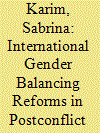

|
|
|
|
|
| Summary/Abstract |
In the aftermath of civil conflict, war-torn states often require reform of their government institutions. Gender balancing, or the inclusion of more women in security-sector institutions, is an increasingly common reform incorporated into state-building processes. Our theoretical priors suggest that gender balancing may influence unit cohesion, operational effectiveness with respect to sexual and gender-based violence, and organizational gender norms. We study these propositions using laboratory experiments with police officers of the Liberian National Police (LNP). We randomly assigned the proportions of women and men in 102 groups of six LNP officers to observe their deliberative processes and group choices. In our experiment, adding more women increased unit cohesion, but we find no evidence to suggest that simply adding more women would increase group (or individual) sensitivity to sexual and gender-based violence. We also find that, despite an increase in participation and influence by women, male beliefs about women's role in policing do not improve with the inclusion of women. As one of the first experimental studies to assess the effects of gender composition within the actual population of interest, our results shed light on how international interventions to address gender equality in postconflict countries affect important outcomes related to security.
|
|
|
|
|
|
|
|
|
|
|
|
|
|
|
|
| 9 |
ID:
161438
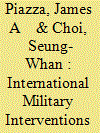

|
|
|
|
|
| Summary/Abstract |
Are states that engage in foreign military interventions vulnerable to subsequent transnational terrorist attacks? If so, do all types of foreign interventions stimulate terrorism? Using data on international military interventions for 125 to 182 countries during the period from 1970 to 2005, we demonstrate that states experience more terrorism after they engage in military interventions. In particular, politico-strategic use of military force abroad—for example, interference in another country's domestic disputes, territorial interventions, or interventions to affect local politics and policy—leads to increased subsequent transnational terrorist attacks for the intervener. In contrast, socioeconomic foreign military interventions, such as those geared toward providing humanitarian relief, protecting social groups, or securing economic interests, do not lead to an increase in transnational terrorist attacks against intervening states.
|
|
|
|
|
|
|
|
|
|
|
|
|
|
|
|
| 10 |
ID:
161428


|
|
|
|
|
| Summary/Abstract |
In this article we assess American public attitudes toward the just war principles of proportionality, due care and distinction. Consistent with the logic of proportionality, we find that Americans are less willing to inflict collateral deaths on foreign civilians when the military advantage of destroying a target is lower. Most Americans also are willing to risk the deaths of American soldiers to avert a larger number of collateral foreign civilian deaths, which accords with the due care principle. Nevertheless, we find that the public's commitments to proportionality and due care are heavily biased in favor of protecting American soldiers and promoting US national security interests. Moreover, we find little evidence that the majority of the public supports the principle of noncombatant immunity, and, contrary to just war doctrine, Americans are more likely to accept collateral deaths of foreign civilians when those civilians are described as politically sympathetic with the adversary.
|
|
|
|
|
|
|
|
|
|
|
|
|
|
|
|
| 11 |
ID:
161439


|
|
|
|
|
| Summary/Abstract |
The increasing availability of event data has led to a surge in micro-level research investigating civil war violence. Event data, however, introduces bias due to systemic underreporting of events. This study introduces a method that accounts for this bias by making a spatial prediction of unreported events based on the known locations of rebels and their preferences for local-level factors estimated using habitat analysis. I then combine this prediction with known locations of rebel activity and use it to predict rebel territory and relocation patterns. I next perform a regression analysis on 119 African rebel groups that links preferences to conflict behavior. Preferences for gold, petroleum, gemstones, and cobalt are associated with civilian victimization, whereas rebels who prefer steeper slopes are more successful in battles with government forces. Further, government forces tend to be successful when battling rebels with preferences for petroleum and international borders.
|
|
|
|
|
|
|
|
|
|
|
|
|
|
|
|
| 12 |
ID:
161430


|
|
|
|
|
| Summary/Abstract |
How do states achieve status? Although we rely on status to explain important phenomena in international politics—such as wars and the foreign policy of emerging powers—we still do not understand what status is or where it comes from. Previous research treats status as a function of state attributes, such as wealth and military capability. Following Weber, I argue that status depends on social recognition: it concerns identification processes in which an actor gains admission into a club once they follow the rules of membership. Therefore, systematic social processes, which cannot be reduced to state attributes, influence status. In particular, status is self-reinforcing. Moreover, social closure influences status—which implies that (1) a state's existing relations influence its ability to achieve status and (2) states recognize similar states rather than states with the most impressive portfolio of certain attributes. To investigate the determinants of international status, I move beyond ranking states based on attributes to examine quantitatively how status emerges from state relations. Leveraging inferential network analysis, I examine state practices that express recognition—specifically, the network of embassies. The analysis indicates that self-reinforcing dynamics and social closure, rather than state attributes directly, drive status recognition.
|
|
|
|
|
|
|
|
|
|
|
|
|
|
|
|
| 13 |
ID:
161434
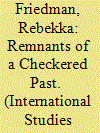

|
|
|
|
|
| Summary/Abstract |
I examine the ways in which female Liberation Tigers of Tamil Eelam (LTTE) experienced social reintegration—the processes through which cadres navigate their post-war identities and social relationships. Recent feminist work looks at women's participation in armed struggle as a transgression of traditional gendered norms and a form of political action. While this literature highlights female protagonism during war and female fighters’ capacity for political agency, I argue that it insufficiently examines female cadres’ personal, community-driven, and social motivations. Drawing on in-depth research carried out with female LTTE in northern Sri Lanka, I maintain that women joined the LTTE for a range of personal, social, political, and community-based reasons. Feminist scholars should further explore the personal side of agency. Going further, I argue that transformative reintegration needs to recognize and address the multifaceted reasons that motivate women to join armed groups. Recognizing the drivers of women's participation in armed groups is paramount both for female cadres’ transitions to civilian life and to facilitate positive social relations with their communities.
|
|
|
|
|
|
|
|
|
|
|
|
|
|
|
|
| 14 |
ID:
161437


|
|
|
|
|
| Summary/Abstract |
Although more than 800,000 displaced people arrived in Greece by sea in 2015, fewer than 5 percent applied for asylum in this first country of arrival. Instead, they either traveled northward informally or remained in Greece in legal limbo. The resultant chaotic conditions deprived many refugees of the benefits of asylum and formal relocation procedures, and also reduced the Greek government's popularity among natives. We argue that governments, regional and international organizations, and aid groups can undermine compliance with their own policies by mishandling information dissemination. Common crisis-management tools—such as frequent policy changes, information dissemination limits, and ad-hoc policy implementation—can easily backfire. Information mismanagement can lead people to develop deep distrust in government and aid organizations, and instead turn to informal brokers like smugglers. To assess our theory, we draw on over 80 discussions with migrants and refugees in Greece, on 25 semistructured interviews with aid workers and government officials, and on weekly rumor correction newsletters produced by the nongovernmental organization Internews. We conclude that governments must prioritize effective communication and policy transparency, especially in crisis contexts.
|
|
|
|
|
|
|
|
|
|
|
|
|
|
|
|
| 15 |
ID:
161435


|
|
|
|
|
| Summary/Abstract |
U.N. peacekeeping missions succeed in preventing the resumption of conflict and saving lives. At the same time, a series of sexual exploitation and abuse scandals since the early 2000s has raised concerns about the conduct of peacekeepers. We examine a related, but generally overlooked, potential negative externality of peacekeeping missions: the forced trafficking of sex workers. We argue that U.N. peacekeepers increase demand for sex work and that this demand may be met through human trafficking for forced prostitution. Using data on U.N. peacekeeping missions between 2001 and 2011, we evaluate the effect of a peacekeeper presence on human sex trafficking in and around the host state. We find that the presence of U.N. peacekeeping forces correlates positively with a state being cited as a destination for forced prostitution. This has important implications for the future deployment of peacekeeping forces around the world.
|
|
|
|
|
|
|
|
|
|
|
|
|
|
|
|
| 16 |
ID:
161425


|
|
|
|
|
| Summary/Abstract |
Although private foreign aid has expanded dramatically in recent years, we still lack detailed information on the allocation of those private aid flows. We use a novel approach to examine the funding decisions of individuals with respect to international development assistance. We analyze the speed at which requests from microentrepreneurs in developing countries are fulfilled through a US-based Internet organization that bundles individual contributions and transfers them as interest-free loans to developing countries. Survival analysis finds little evidence for the expectation that private donors behave as rational aid givers, nor do we see private funders mimicking the behaviors of official aid agencies. Rather, private microloans seem principally influenced by humanitarian crises, along with the presence of migrant and diaspora networks from recipient countries. We conclude that international private aid is shaped by social linkages between individual donors and recipients. It can therefore fund areas neglected by traditional foreign aid. As a result, private foreign aid serves, in at least some cases, as a complement to official development assistance.
|
|
|
|
|
|
|
|
|
|
|
|
|
|
|
|
| 17 |
ID:
161424


|
|
|
|
|
| Summary/Abstract |
A large body of research examines the relationship between democracy and foreign direct investment (FDI). Scholars offer numerous arguments about why democratic institutions encourage or discourage FDI. Yet, almost all statistical work examines whether democracies receive more or less FDI than nondemocracies. Direct evidence on the underlying theoretical mechanisms that might account for such variation remains scant. We perform a metaregression analysis to test whether proposed mechanisms are consistent with observable evidence from previous studies or not. Our sample includes 229 model estimates from forty prior studies. We reach three major findings with respect to theoretical mechanisms, FDI measurement, and publication bias. Our research demonstrates that metaregression provides a useful tool for adjudicating theoretical arguments and evaluating publication bias, especially when the accumulated literature presents contradictory findings.
|
|
|
|
|
|
|
|
|
|
|
|
|
|
|
|
| 18 |
ID:
161422


|
|
|
|
|
| Summary/Abstract |
Existing surveys and anthologies wrongly convey the impression that women in the past did not think seriously about international politics. This article provides evidence of the magnitude of the exclusion of historical women from the field by analyzing sixty texts in the history of international thought and disciplinary history. It also begins the process of remedying this exclusion. I map a new agenda for research on the history of women's international thought. Work in feminist historiography, as well as new archival research, suggests that a diverse array of historical women thought deeply about international relations, but their intellectual contributions have been obscured—and even actively erased. To illustrate what international studies can gain by pursuing a research agenda on historical women's international thought, I discuss a neglected, but at the time extremely important figure, in what might be called “white women's international relations,” the influential scholar of colonial administration, Lucy Philip Mair.
|
|
|
|
|
|
|
|
|
|
|
|
|
|
|
|
|
|
|
|
|